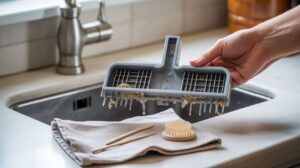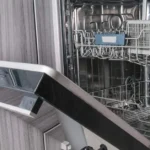Dishwashers are essential appliances, but frequent breakdowns can become a significant inconvenience. When they malfunction, homeowners often face costly repairs or replacements, disrupting daily routines and adding unexpected expenses.
Ignoring regular maintenance or failing to address minor issues can turn a simple problem into a bigger one. From clogged filters to worn-out seals, neglecting your dishwasher can lead to costly repairs, longer wait times, and even reduced appliance lifespan.
The good news is that you can easily avoid these expensive repairs with a few simple maintenance tips. Regular care and attention can keep your dishwasher running smoothly, saving you money and frustration in the long run. This guide will show you how to care for your dishwasher properly to avoid costly repairs.
Tips for Preventing Costly Dishwasher Repairs.
Dishwashers are built to make life easier, but they can quickly become a headache without the proper care. Instead of waiting for costly repairs, simple maintenance steps can keep your appliance running smoothly. Beach 2 Bay Appliances offers trusted solutions to keep your dishwasher in top condition. Here are some practical tips to prevent problems before they start and save you money.
Regularly Clean the Filters
Your dishwasher filters trap food particles that could damage the pump and clog the drain. Most dishwashers have filters at the bottom that need cleaning every 1-2 weeks. Dirty filters cause poor cleaning results and can lead to expensive repairs.
To clean your filters:
- Remove the bottom rack to access the filter assembly.
- Twist and lift out the cylindrical filter
- Rinse under warm water to remove debris
- Use an old toothbrush to gently scrub away stuck-on food.
- Check for any small items like glass shards that might be trapped.
A helpful tip many people miss: After cleaning, check that the filter is completely dry before reinstalling it. Moisture left in the filter can grow mould and create unpleasant odours that will transfer to your dishes.
Inspect and Clean Spray Arms
The spray arms make your dishwasher work. They spin and spray water to clean your dishes. If the tiny holes in these arms get clogged with food bits or mineral deposits, your dishes won’t get clean, and your dishwasher will have to work harder.
To keep spray arms working well:
- Remove the spray arms (usually they twist off or are held by a single screw)
- Hold them under running water to flush out larger particles
- Use a toothpick or small wire to clear each spray hole
- Look for cracks or damage while cleaning
A little-known fact: Many homeowners don’t realise that vinegar is excellent for clearing mineral buildup in spray arm holes. If you notice white mineral deposits, soak the arms in white vinegar for 30 minutes before cleaning. This simple step can add years to your dishwasher’s life and improve cleaning power.

Ensure Proper Loading Techniques
Loading your dishwasher correctly helps it clean better and prevents damage to both dishes and the machine. Improper loading forces the dishwasher to work harder and can block water spray patterns.
Always place dishes facing the centre where spray arms can reach them. Put larger items on the sides and back so they don’t block water flow. Keep plastics on the top rack to avoid melting, and never put wooden items or special knives in the dishwasher.
Many repair technicians share a tip: Leave small gaps between dishes rather than cramming them together. These gaps allow water to flow freely between items. Also, remove large food chunks before loading your dishwasher isn’t a garbage disposal! Scraping plates first means less strain on your machine’s filter system and pump. This simple habit can prevent some of the most common causes of dishwasher breakdowns.
Use the Right Detergent
Using the wrong detergent can damage your dishwasher over time. Always use detergents made specifically for dishwashers – never use regular dish soap or laundry detergent, as these create too many suds that can leak and damage the motor.
If you have hard water, look for detergents with built-in water softeners. You’ll need less detergent for homes with water softener systems than the package suggests. Too much detergent can leave a film on dishes and build up inside your machine.
Many people don’t know: The age of your dishwasher detergent matters. Dishwasher detergent can lose its cleaning power if stored too long, especially in humid areas like under the sink. Check the manufacturing date and try to use the detergent within 2-3 months of purchase for best results. Fresh detergent means cleaner dishes and less wear on your machine.
Maintain the Door Seal
The rubber seal around your dishwasher door keeps water inside during cycles. If this seal gets dirty, damaged, or dried out, water can leak onto your floor, damage your cabinets, or cause electrical problems.
Clean the door seal monthly with a damp cloth to remove food particles and detergent buildup. Check for cracks, tears, or areas where the seal might pull away from the door. If you spot damage, replace the seal before it leads to leaks.
A helpful tip from appliance experts: Apply a thin layer of food-grade silicone lubricant to the door seal twice a year. This keeps the rubber soft and prevents it from drying out or cracking. Avoid petroleum-based products like Vaseline, which can break down the rubber over time. This simple maintenance step costs just a few dollars but can prevent leaks that might otherwise damage your kitchen floor.
Make Sure the Flow Pressure Is Right
Your dishwasher needs proper water pressure to clean effectively. Too little pressure means dirty dishes, while too much can damage internal parts and cause leaks. Most dishwashers work best with water pressure between 20 and 120 psi.
You can check your water pressure with a simple gauge that attaches to an outdoor spigot. If pressure is too low, look for kinks in supply lines or partially closed water valves. If pressure is too high, you might need a pressure regulator installed on your home’s main water line.
A little-known fact: Running water in other parts of your home during a dishwasher cycle can reduce water pressure to your dishwasher. Avoid showering, laundry, or running bathroom faucets while your dishwasher runs. This simple habit ensures your dishwasher gets the full water pressure it needs for proper cleaning and prevents the motor from working too hard to compensate for low pressure.
Keep the Drainage System Clean
A clean drainage system prevents water backup that can damage your dishwasher’s motor and electronic parts. The drain hose and air gap (if your dishwasher has one) need regular checks to stay clear.
Look under your sink for the drain hose that connects your dishwasher to the garbage disposal or drain pipe. Make sure it’s not kinked or bent. If your dishwasher has an air gap (a small cylinder on top of the sink), remove the cap and clean out any debris inside.
Pro tip: Pour a mixture of equal parts baking soda and vinegar down your dishwasher drain once a month, followed by hot water. This natural cleaning solution breaks down grease and food particles that build up in the drainage system. Many repair calls could be avoided with this simple monthly habit that costs pennies but saves hundreds in potential repair bills.
Avoid Overusing the Dishwasher
Running your dishwasher too often or with too few dishes puts unnecessary strain on all its parts. This leads to faster wear and tear on motors, pumps, and seals.
Wait until you have a full load before running a cycle, but don’t overpack it. Most dishwashers are designed to run 4-5 times per week for an average family. If you live alone, consider running it 2-3 times weekly.
Something many people don’t realise: The “quick wash” or “light” cycles are more complex on your dishwasher than regular cycles. These cycles use more water pressure and faster pump speeds to clean in less time. Save these cycles for lightly soiled dishes only. For everyday use, the normal cycle uses less energy and creates less wear on your machine’s components, even though it runs longer. This can add years to your dishwasher’s life.
Schedule Professional Maintenance
Even with excellent home care, professional maintenance once a year can catch problems before they become expensive repairs. A service technician can check parts you can’t easily access.
During professional maintenance, the technician inspects heating elements, checks water temperature, tests door springs, and looks for early signs of leaks or electrical issues. Many companies offer maintenance plans that cost less than emergency repairs.
A valuable insight: Ask your maintenance technician to check the water inlet valve during yearly service. This small part controls water flow into your dishwasher and is one of the most common failure points. It often shows warning signs before complete failure, but it is hard for homeowners to spot. A technician can identify and replace a struggling inlet valve for about $50-100, saving you from a potential flood and a later $300+ emergency service call.
Understand Common Issues Before Calling
Knowing fundamental dishwasher problems can save you money on service calls. Some issues have simple fixes you can handle yourself.
If dishes aren’t getting clean, check filters and spray arms for clogs. If the dishwasher won’t drain, check for food buildup in the drain area. Strange noises often mean something is stuck in the pump or spray arm. White film on dishes usually signals challenging water issues or detergent problems.
Here’s a helpful tip many repair guides miss: Check your home’s circuit breaker panel before calling a repair service for a dishwasher that won’t start. Even if other kitchen appliances work, dishwashers often have their dedicated circuit that may have tripped. Also, many modern dishwashers have a hidden reset function – press and hold the “heated dry” button for 3-5 seconds, then the “normal” button for 3-5 seconds. This simple reset solves many electronic glitches and can save you a $75-150 service call fee.
Why Routine Dishwasher Maintenance Makes a Big Difference
Regular upkeep helps your dishwasher work better for longer. Simple steps like cleaning filters or checking spray arms can stop minor problems from turning into expensive repairs. It also keeps your dishes cleaner and your home running smoothly.
A Consumer Reports survey of over 125,000 members found that 68% of people with a malfunctioning dishwasher attempted a repair, and 73% succeeded on the first try. This shows how simple care and basic troubleshooting often solve problems without costly service calls.
If you’re wondering what to do and how often, a helpful guide covers this in more detail.
Keep Your Dishwasher Running Smooth with Beach2Bay Appliance Service in Niceville
Regular care is key to fewer breakdowns and a longer-lasting dishwasher. Beach2Bay Appliance Service in Niceville offers trusted maintenance and repair support that helps homeowners avoid expensive problems. Call 850-830-8306 to book a check-up or ask about yearly service plans that fit your schedule.
Author Profile
- John Raymond Hagler
- Beach2Bay Appliances is a trusted name in Florida for professional appliance repair services. Serving homeowners, realtors, and property managers, our experienced team focuses on reducing costly breakdowns and maximizing appliance efficiency. Committed to reliability, transparency, and customer care, we help maintain the value and functionality of homes and rental properties through routine service and urgent repairs.
Latest entries
 BlogsAugust 30, 2025Oven Smells Like Burning While Cooking? Here’s the Solution
BlogsAugust 30, 2025Oven Smells Like Burning While Cooking? Here’s the Solution BlogsAugust 29, 2025Why Your Dishwasher Isn’t Cleaning Dishes and How to Fix It
BlogsAugust 29, 2025Why Your Dishwasher Isn’t Cleaning Dishes and How to Fix It BlogsAugust 29, 20257 Reasons Your Microwave Isn’t Working and How to Fix It Quick
BlogsAugust 29, 20257 Reasons Your Microwave Isn’t Working and How to Fix It Quick BlogsAugust 27, 2025Why Your Refrigerator Isn’t Cooling and How to Fix It
BlogsAugust 27, 2025Why Your Refrigerator Isn’t Cooling and How to Fix It
